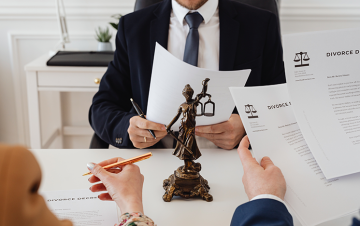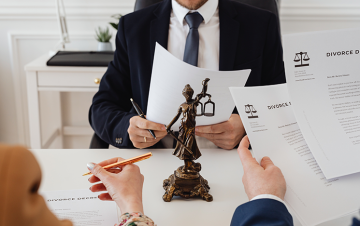Intentional serious bodily injury: legal support
A lawyer under Article 121 of the Criminal Code of Ukraine, which provides for liability for intentional grievous bodily harm, plays a key role in protecting the rights and interests of persons who find themselves at the epicenter of such a serious criminal case. Intentional grievous bodily harm is a criminal offense that includes actions that lead to significant physical harm to the victim's health, which may have long-term consequences or threaten his life.
Such a case requires a highly qualified approach, because the severity of the consequences for the accused can lead to severe punishments, including long-term imprisonment. A lawyer specializing in such cases helps to collect the necessary evidence, protects the client at all stages of the process and provides legal assistance in defending rights and interests, ensuring the best possible result.
Legal stages in intentional serious bodily injury
Legal work usually includes several key stages that allow for effective resolution of legal issues:
- Consultation: Legal work usually begins with a meeting or consultation with the client, during which the lawyer listens to the problem or personal injury case, defines the goal and provides advice.
- Analysis of the facts: After the consultation, the lawyer collects and analyzes all the facts relevant to the case under Article 121 of the Criminal Code, examines the legal aspects and assesses the strengths and weaknesses.
- Research: If necessary, a lawyer can conduct additional research on legislation, case law and previous decisions in order to prepare an informed approach to the case under Article 121 of the Criminal Code.
- Strategy development: Based on the data gathered, the lawyer develops a strategy to solve the problem or case, identifying the steps necessary to achieve the client's goal.
- Representation in court or before authorities: The lawyer can represent the client's interests in court, arbitration or before other authorities, if necessary.
- Negotiation and mediation: In some cases, a lawyer may negotiate with other parties or act as a mediator in order to reach an amicable resolution of the conflict.
- Preparation of documents: A lawyer can prepare the necessary legal documents, such as agreements, motions, statements or other documents that meet the needs of the case.
- Monitoring and appeal: If necessary, the lawyer can monitor the progress of the case, as well as file appeals and protect the interests of the client in appeal or cassation instances.
- Support and consultation throughout the process: The lawyer provides support and consultation to the client throughout the process, from the initial stages to the end of the case.
Proper completion of all stages of legal work is critically important for achieving a successful outcome in the case. From consulting to monitoring and appeals - each step has its role in resolving the situation.
Under what conditions can a lawyer's service for intentional serious bodily injury be provided?
To receive a legal service, it is necessary to take into account several important conditions that determine the legality and possibility of its provision:
- Conclusion of the agreement: Legal service in the matter of causing serious bodily injury can be provided after the conclusion of an agreement between the client and the legal professional, which defines the scope of services, conditions, cost and other aspects.
- Acceptance of the case: The lawyer can accept the case, iif it falls under his or her competence and if there is an opportunity to provide the necessary assistance.
- Payment terms: The customer may be required to pay the cost of the service in accordance with the terms of the agreement, including fees, rates or other specified costs.
- Compliance with legal restrictions: The service can be provided only in cases where the lawyer complies with the requirements of professional ethics and legal restrictions.
These conditions guarantee that the service will be provided properly, and legal security is maintained for the client.
Under what conditions can a lawyer's service for intentional serious bodily injury not be provided?

Conflict of Interest: A lawyer may not accept a personal injury case that creates a conflict of interest between him or her and other clients or parties.

Need for specialized knowledge: If the case requires specialized knowledge or skills that the lawyer or law firm does not have, service may be declined.

Violation of the law: A lawyer cannot provide services if it is contrary to the law or ethical standards.
How to deal with the issue of intentional serious bodily injury on your own?
The main steps for independent problem resolution:
- Research: Start with the basics. Read articles, books or online resources about the area of law that interests you. Understanding the basic concepts and principles will help you understand more complex issues more easily.
- Legal databases: Use legal databases that may contain the text of laws, court decisions, and other useful information.
- Professional consultation: If necessary, do not hesitate to contact legal advisors or attorneys for professional assistance. Many lawyers provide free or paid consultations.
- Analyze the facts: To better understand your specific situation, pay attention to all the circumstances and facts. Compare them with the relevant legal standards and legislation.
Independent research and analysis of the legal aspects of the situation can give a general idea of the possible steps, however, to achieve the optimal result, it is worth contacting a lawyer. This allows not only to save time, but also to avoid possible legal errors that can lead to negative consequences.
Common questions about intentional serious bodily injury
Question
List of serious injuries?
Answer
Serious injuries can be of different nature and include such conditions as: Bone fractures: This is a break in a bone or a break in its contours, which can cause significant pain and limitation of movement. Internal Organ Damage: Injuries that can lead to damage to organs such as the heart, lungs, liver, kidneys, etc. Head and back injuries: These can lead to brain disorders, paralysis, impaired coordination and other serious consequences. Burns: Damage to the skin and tissues resulting from contact with high temperatures, chemicals or other agents. Blood loss: Large amounts of blood lost can lead to shock and other dangerous conditions. Infections and other complications: Various complications can occur after an injury, including wound infections, bleeding, or even sepsis. Disability: A severe injury can result in permanent disability that limits movement or self-care.
Question
What is the article for grievous bodily harm?
Answer
The article that defines liability for grievous bodily harm may differ depending on the country and its legislation. For example, in Ukraine, liability for grievous bodily harm is regulated by Article 121 of the Criminal Code of Ukraine.
Question
What are the types of serious injuries?
Answer
Bone fractures, damage to internal organs, head and back injuries, burns and other chemical injuries, blood loss, disability.
What does the cost of a lawyer's service under Article 121 of the CCU depend on?
The price may depend on several factors. First of all, the price is affected by the complexity of the case: the more details and evidence that need to be collected to prove the client’s guilt or innocence, the more time and effort the lawyer requires. The experience and qualifications of the lawyer are also an important factor, as experienced lawyers who have experience working in similar cases may have a higher rate. The complexity and length of the trial, the number of hearings, and the need to involve experts can also increase the cost of services. In addition, the geographic location of the lawyer and the level of his reputation in the legal community can affect the price.
ConclusionIn general, to successfully resolve legal issues, especially those related to serious personal injury, it is important to understand all stages of the process and the terms of providing legal services. A lawyer must act in accordance with certain ethical and legal requirements in order to provide assistance to the client. If the client decides to act independently, it is important to conduct proper research and consult with specialists to avoid serious mistakes.








































